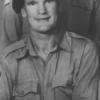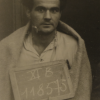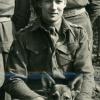Brigadier Paul Crook, who has died aged 89, won a DSO for his leadership of 3 Para Group in the assault on El Gamil airfield during the Suez Crisis.
In the summer of 1956, Gamal Abdel Nasser, the Egyptian President, nationalised the Suez Canal, which was owned by a joint Anglo-French company, and closed it to Israeli shipping. At the end of October, Israel invaded the Gaza Strip and the Sinai Peninsula and advanced towards the Canal Zone.
Meanwhile, Britain and France bombed Egyptian targets in an attempt to force the re-opening of the Canal, and deployed their troops in readiness for an invasion. 3 Para Group, commanded by Crook, was ordered to capture El Gamil airfield, Port Said, advance to the east of the town and link up with the seaborne Royal Marines.
The first transport aircraft in Operation Musketeer took off from Nicosia airport at dawn on November 5. El Gamil airfield was long and narrow and largely surrounded by water. Hard intelligence as to the dispositions of the Egyptian forces was limited, and when Crook and 600 men of 3 Para were dropped into action at first light the leading companies came under mortar, machinegun and tank fire from an Egyptian battalion group.
One enemy company, armed with medium machineguns, was operating from two pillboxes and another strong company position was located in a cemetery closer to the town. Crook's command team dealt with the enemy positions, firing at them from a distance by calling on the weapons of Support Company and strikes by the Fleet Air Arm.
The airfield was quickly cleared and secured, and, following an airstrike by Venoms and Sea Hawks, at 10.30 am an attack went in against the unit deployed in the cemetery. Some Egyptian soldiers fought with considerable courage, but few employed aggressive tactics and no counter-attacks were mounted.
3 Para Group was reinforced by a second drop of men and equipment in the afternoon. By dusk, the group had overwhelmed an enemy superior in numbers and secured an area considerably larger than that originally demanded of them. It had also captured large quantities of arms and ammunition while sustaining light casualties.
A French parachute battalion held Port Fuad and, the following day, a seaborne invasion took place. After intense pressure from the United Nations and the USSR, however, the French and British were forced to withdraw and, shortly before midnight on November 6, a ceasefire took effect.
The citation for the DSO awarded to Crook stated that his gallantry under fire, his inspiring leadership and the skill with which he handled his force made an immeasurable contribution to the success of the action.
Paul Edwin Crook was born at Croydon, Surrey, on April 19 1915 and educated at Uppingham before going up to Emmanuel College, Cambridge, to read Classics and Law. He was commissioned into the Queen's Own Royal West Kent Regiment (QORWK) in 1935 and went with the 2nd Battalion to Karachi as a platoon commander.
Crook served in Palestine on internal security operations for two years before the Second World War and then moved to HQ Military Forces West Africa at Accra. After returning to England to attend Staff College, he was posted to 147 Infantry Brigade, part of 49 West Riding Division.
He went to Normandy with his brigade, but his troopship was damaged in the Thames estuary and he arrived on the beaches 12 hours after the landings. He took part in tough fighting in the bocage country and in the capture of Le Havre, before being posted to the United States Command and General Staff School.
A jazz enthusiast and a fine vocalist, Crook took the opportunity to visit New Orleans and said afterwards that he was probably the only person who had sung Basin Street in that street while wearing British Army uniform.
In September 1945 Crook was posted to Singapore, and was present at the signing of the Japanese surrender. As commander of HQ 2 RAPWI (Repatriation of Allied Prisoners of War and Internees), he and his small staff were immediately faced with the problem of organising the feeding, clothing, documentation, hospitalization and embarkation of 34,000 prisoners from 13 widely scattered Japanese camps. Working 20 hours a day, by the end of October he had played a leading part in repatriating 50,000 former detainees.
He was appointed OBE, and at the end of the year was promoted full colonel and appointed Chief Civil Affairs Officer for the Netherlands East Indies.
Crook suffered a severe injury to his back and returned to England in 1947.
After a spell at the War Office, he returned to Staff College as an instructor and then rejoined QORWK. With them, he served as a company commander of the 1st Battalion in Malaya in operations against the Chinese Communists. He was mentioned in despatches for the third time. It was not all jungle fighting, however; he found time to play hockey, representing his battalion and the Army.
In 1954 Crook took command of 3rd Battalion the Parachute Regiment. He hurt his back again, but showed great determination in passing the medical board and getting his wings. He took 3 Para to Cyprus, where it carried out operations against Eoka, and commanded it for a further year after the Suez invasion.
Crook was appointed head of the Army Airborne Training and Development Centre before becoming Commander and Chief of Staff of the Jamaica Defence Force. He was advanced to CBE at the end of his three-year tour. A move to Aden as Security Operations Adviser to the High Commissioner was then followed by a final assignment as Commander Rhine Area. He retired from the Army in 1971 in the rank of brigadier.
Crook was ADC to the Queen from 1964 to 1967. He was Honorary Colonel 16 (Lincoln) Independent Parachute Regiment (TA) from 1974 to 1979; Deputy Honorary Colonel 15 (Scottish) Parachute Battalion (TA) from 1979 until 1983 and 4 th (Volunteer) Parachute Battalion, 1984-85. He held the US Bronze Star.
He wrote a book, Came the Dawn (1989), an account of his 30 years' soldiering. Having retired to a village in Lincolnshire, he subsequently moved to Devon. He followed all sport, but particularly enjoyed cricket and golf. During his life he had sung with some of the greats, including Stephane Grappelli, and at his 80 th birthday gave a performance to rapturous applause.
Paul Crook married first, in 1944, Joan Lewis. The marriage was dissolved and he married secondly, in 1967, Betty Lown (née Wyles), who survives him with a daughter of his first marriage and a stepson.
This obituary is reproduced by kind permission of the Daily Telegraph.
Source: This obituary is reproduced by kind permission of the Daily Telegraph.
Read More




Latest Comments
There are currently no comments for this content.
Add Comment
In order to add comments you must be registered with ParaData.
If you are currently a ParaData member please login.
If you are not currently a ParaData member but wish to get involved please register.